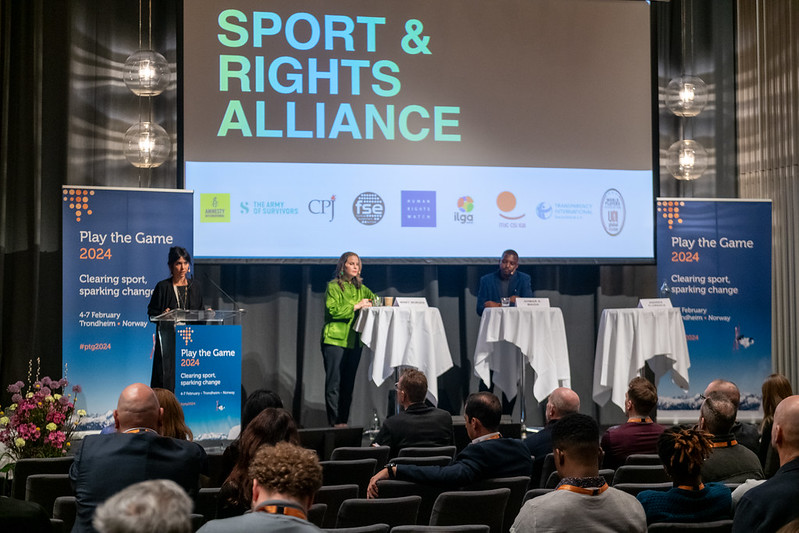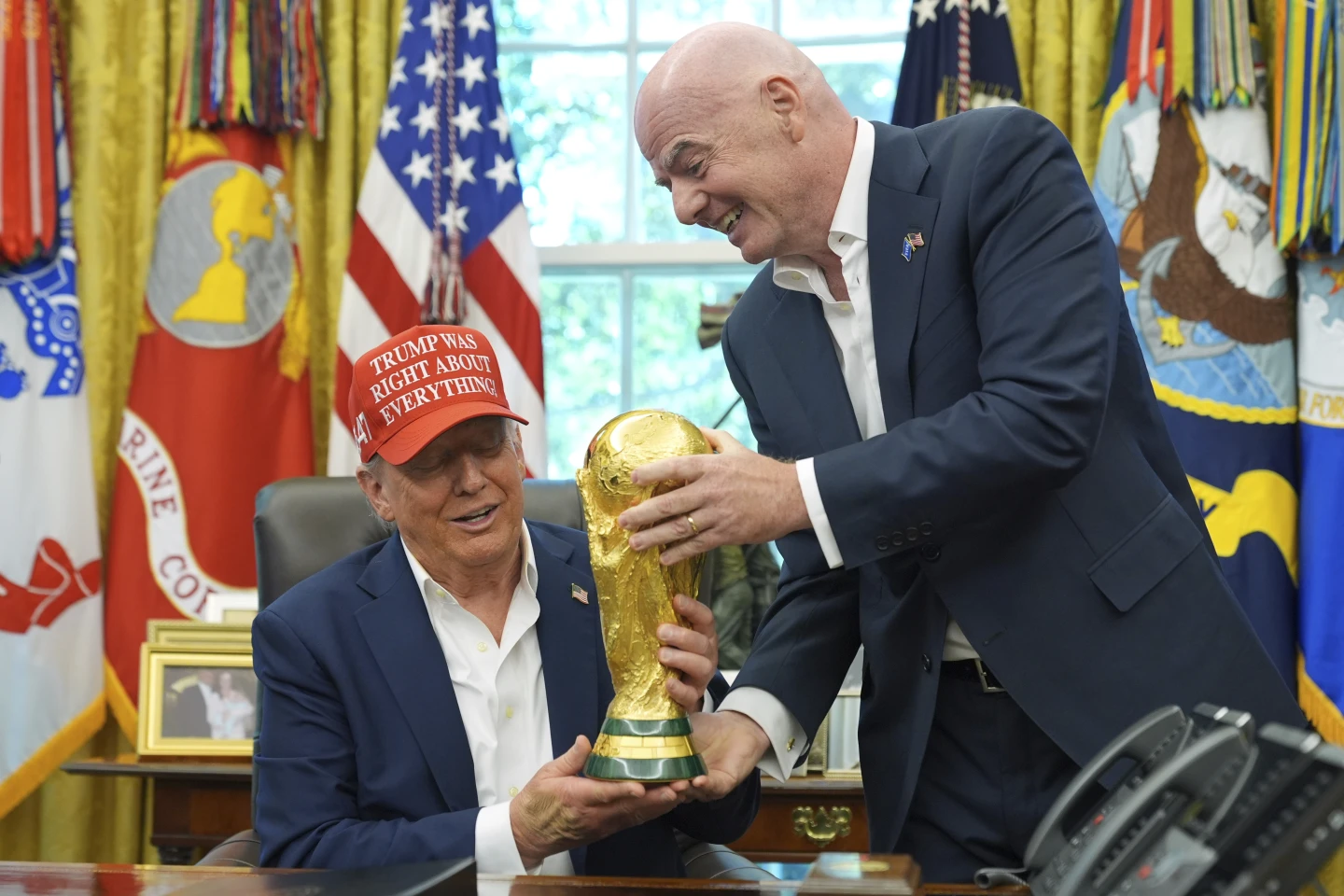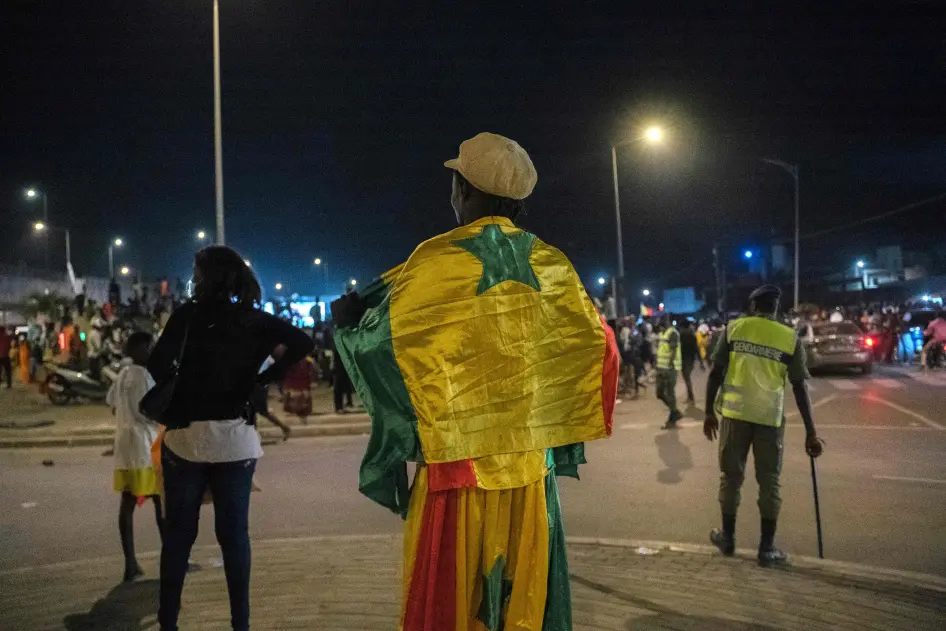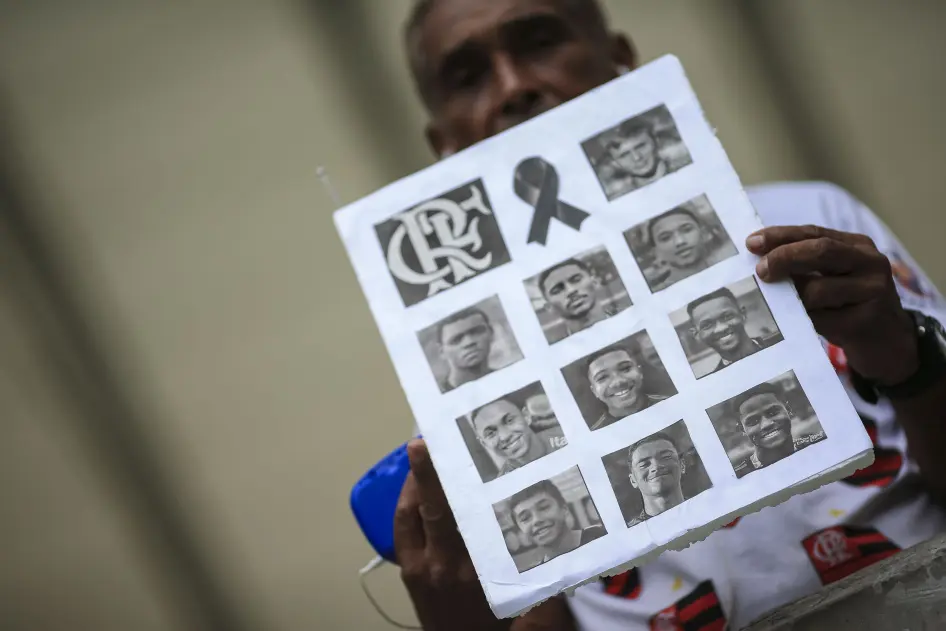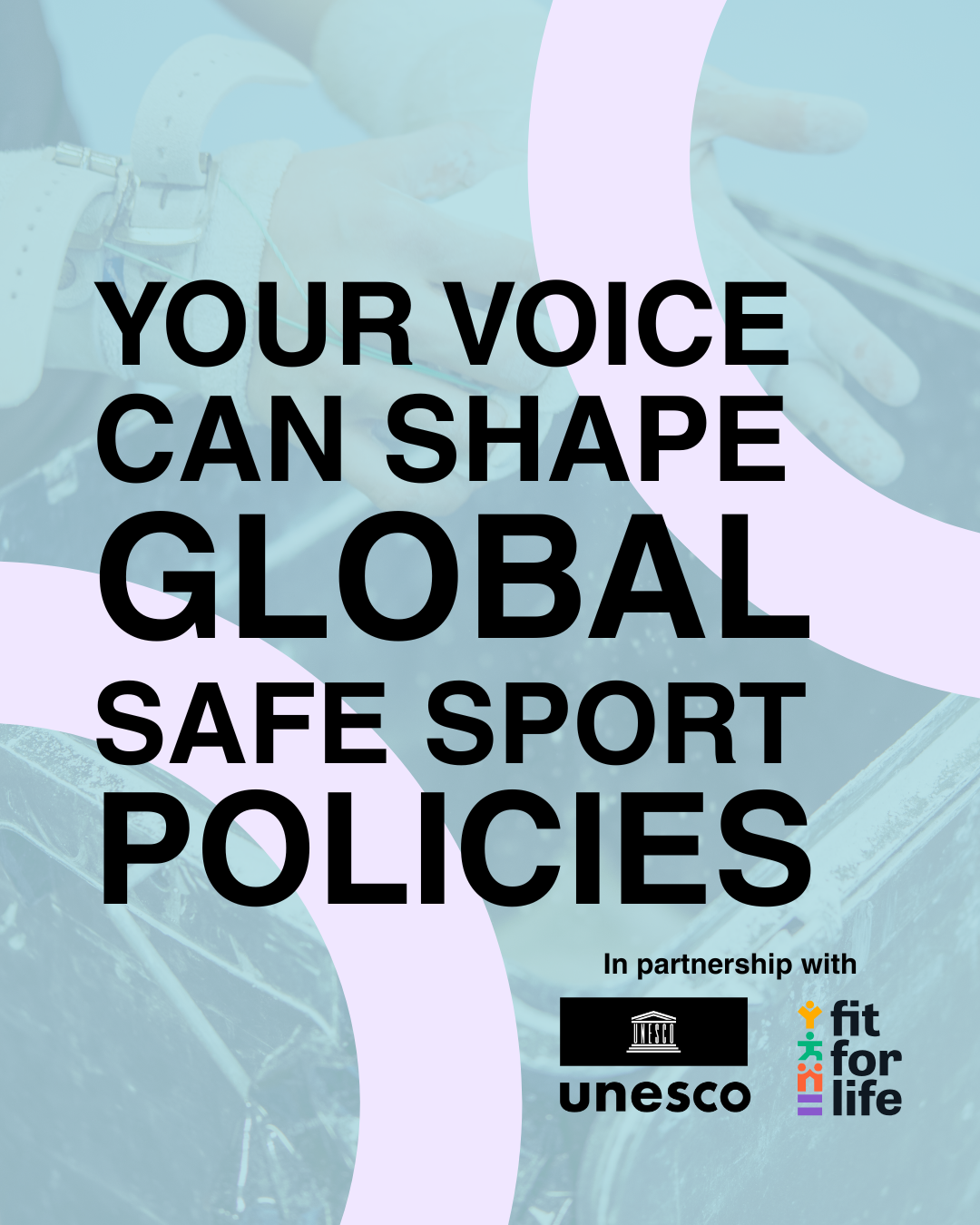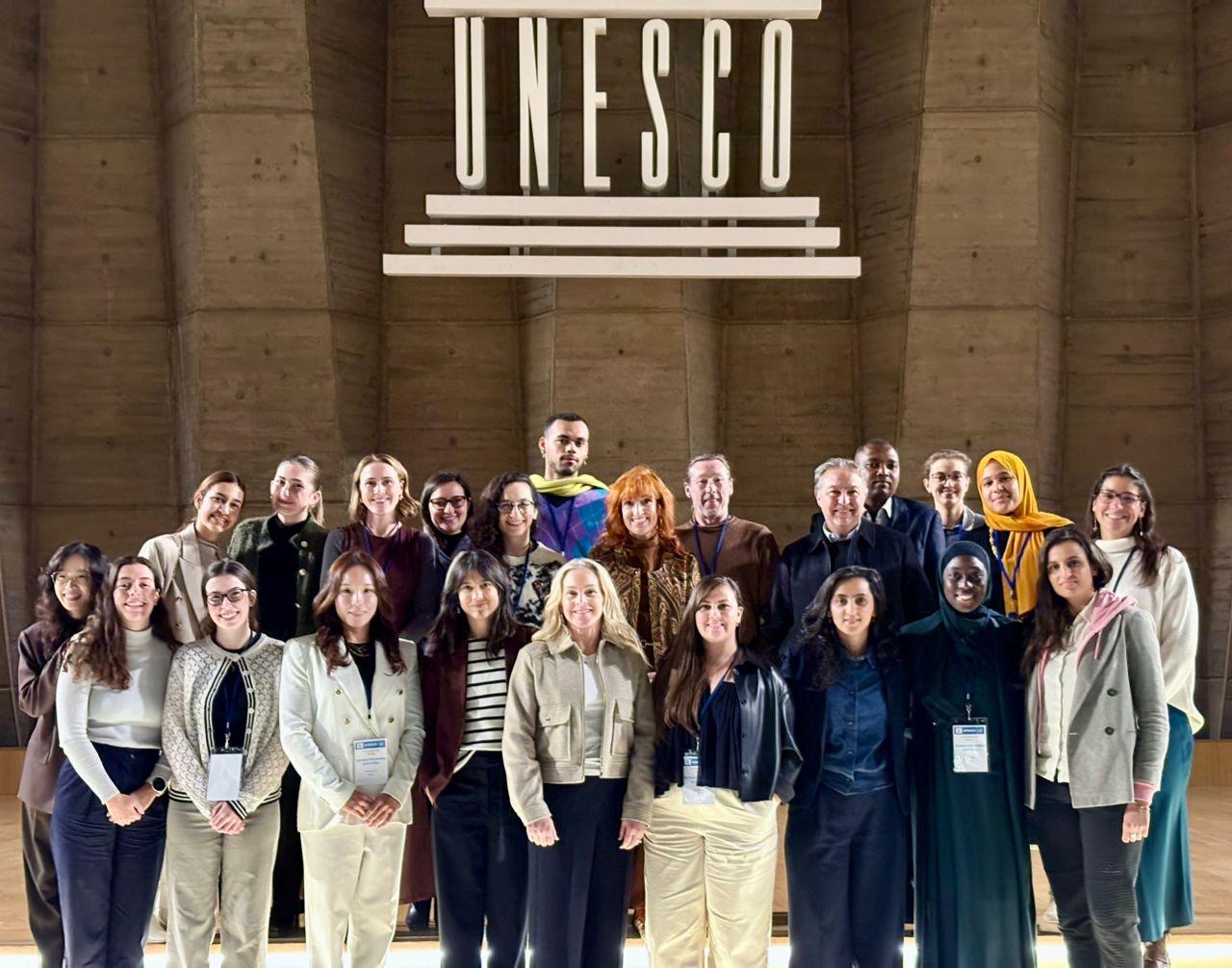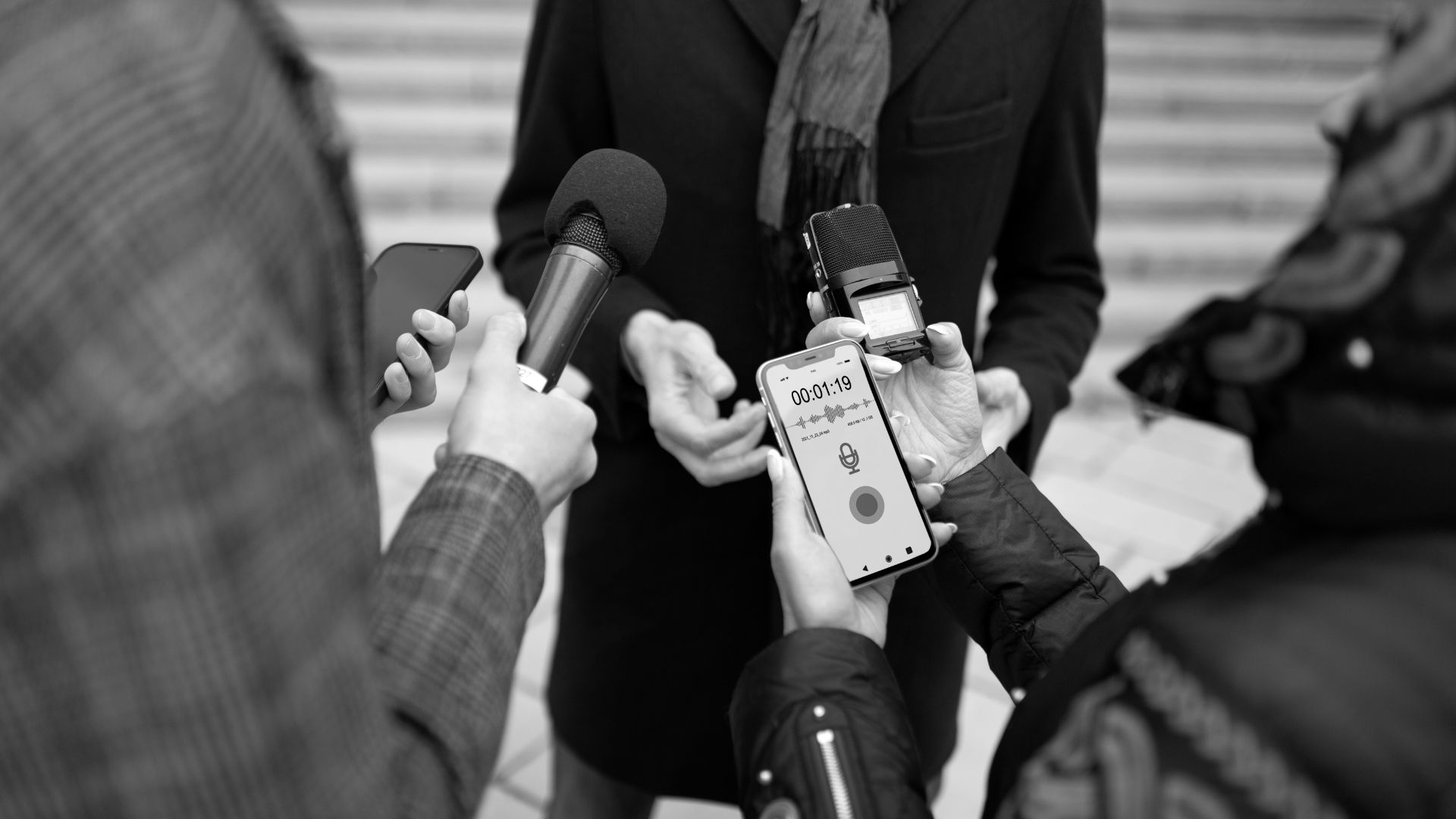The 13th edition of the Play the Game conference held in Trondheim, Norway, this February, brought together academics, journalists, athletes, human rights defenders and other stakeholders in the sports world to discuss the most pressing issues in international sport. The Sport & Rights Alliance (SRA) participated in the forum with a robust delegation, with representatives from both the secretariat and partner organizations presenting on topics ranging from abuse in sport, remedy and prevention to athlete organizing and anti-doping, human rights abuses in countries hosting mega-sporting events and athlete participation at Paris 2024.
Preventing, Investigating & Remedying Abuse in Sport
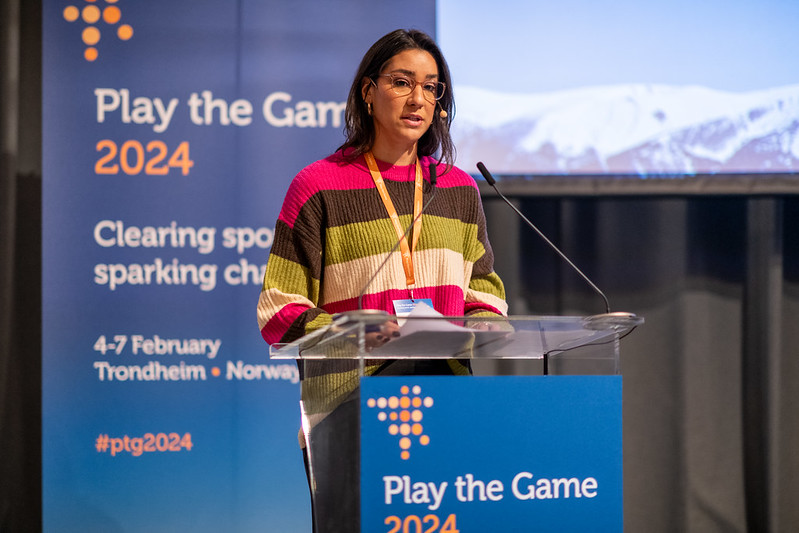
(Photo: Thomas Søndergaard/Play the Game)
On the opening day, Joanna Maranhão, Network Coordinator for the SRA Athletes Network for Safer Sports, delivered a moving keynote address on her journey as an Olympic swimmer navigating the effects of abuse she experienced as a child athlete. At the beginning of a week focused on myriad issues related to sports governance and competition such as doping, match-fixing, and sportswashing, Joanna shared her personal story and made the case that sport integrity’s greatest threat is actually the harassment and abuse of the athletes at the center of it. And that, she explained, is also the key to fixing it: “sparking change” in sport (the theme of this year’s conference) will only be possible when sport puts the voices of impacted people at the center of these reforms. Joanna introduced the SRA’s soon-to-be-launched Athletes Network for Safer Sports, which will amplify and advocate for the inclusion of athlete survivors’ voices around the world.
Building on Joanna’s critical framing, SRA director Andrea Florence joined with SRA partner Minky Worden, director of global initiatives at Human Rights Watch; and strategic partner Ahmar Maiga, executive director of Young Players Protection in Africa–Mali; to present a case study on the Mali Basketball Federation – and everything that can go wrong in a sport governing body’s response to systemic sexual abuse.
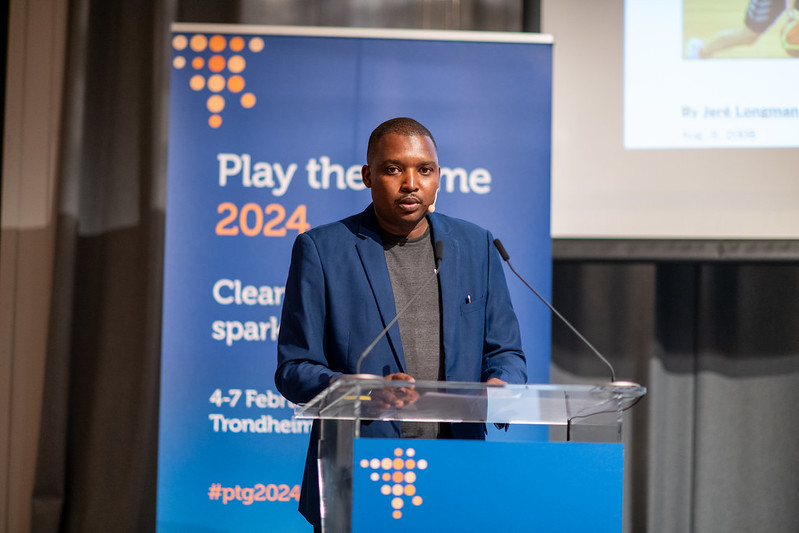
(Photo: Thomas Søndergaard/Play the Game)
Starting off the session by sharing his firsthand experience of advocating for the Malian survivors, Ahmar Maiga explained why even with the international basketball federation FIBA’s zero-tolerance abuse policy, abusers had (and still have) all the power. Ahmar explained that while Senegal prepares to host the 2026 Youth Olympics, millions of young athletes across Africa are still training and competing without proper safeguarding systems, and the Mali case demonstrates just how quickly they can fall through the cracks.
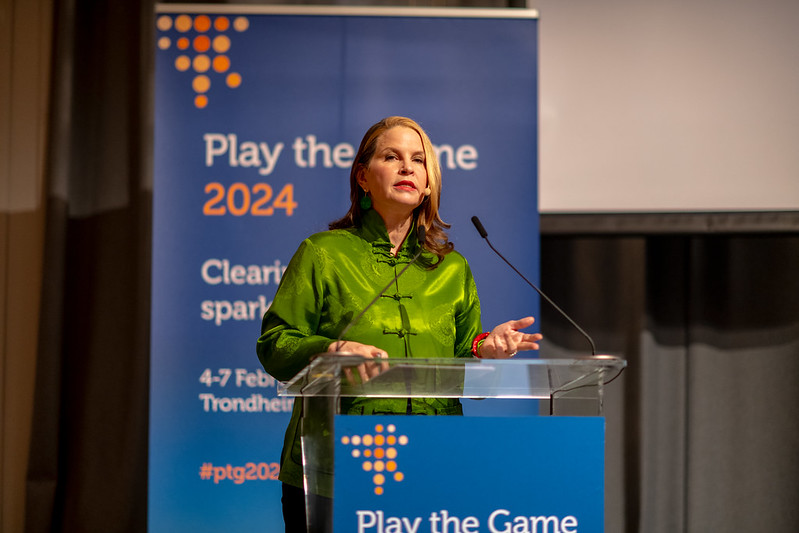
(Photo: Thomas Søndergaard/Play the Game)
Minky Worden then zeroed in on the ultimate accountability of global sport bodies, showing how this problem extends beyond Mali and its girls’ national team to the governance failures of basketball’s global governing body. She pointed out that FIBA is an immensely powerful entity that oversees enormous business, including the NBA and the WNBA, saying, “In short, FIBA has the financial resources to do whatever it has the will to do.”
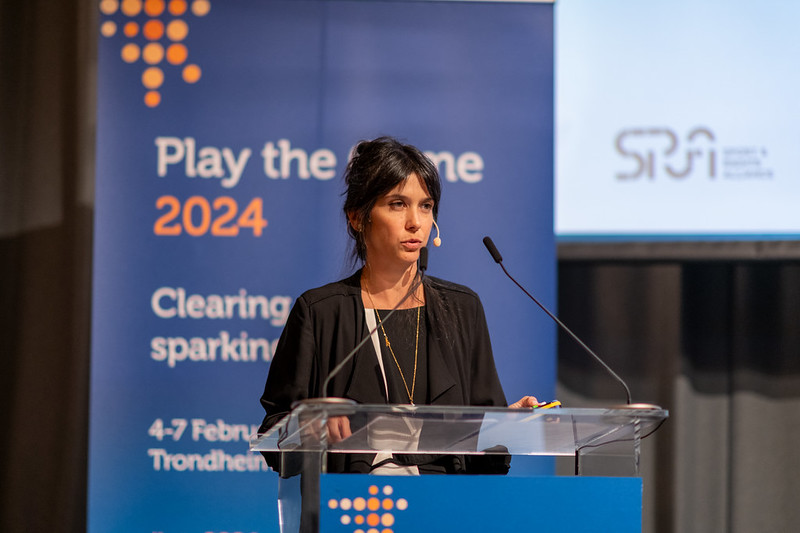
Finally, Andrea Florence ended by circling back to the foundational flaw of so many sport organization’s responses to abuse: the lack of focus and care for the athletes at the center of the investigation. “An investigation that is done online, mainly in English, and embedded with the Mali basketball federation was already doomed to fail,” said Andrea. “How could players trust the very institution that failed them? You can’t work with the abusers and expect to be trusted by victims of abuse.”
(Photo: Thomas Søndergaard/Play the Game)
Executive Director of SRA partner The Army of Survivors, Julie Ann Rivers-Cochran, also participated in a panel focusing on the prevention of abuse in sport. Julie Ann spoke about the prevalence of abusive coaching tactics and explained what compassionate coaching can look like – and that yes, research shows this kind of coaching is actually more effective than emotionally abusive approach. Ultimately, an organization’s prevention efforts must be supported by a trauma-informed, survivor-centered approach to abuse, she argued, one that embraces “institutional courage” and acts with accountability, justice and transparency. To do this, Julie Ann underscored the need for sport organizations to take athlete voices seriously and ensure they have a say in defining what safety and healing look like for them.
The final day of the conference also offered a discussion on the pursuit of remedy for survivors of abuse in sport, featuring Alexandra Gómez Bruinewood, senior legal counsel at FIFPRO (an affiliate of SRA partner World Players Association). Alexandra discussed another example of the many ways an investigation into abuse in sports can go wrong, this time in Argentinian women’s football. In this case, players reported to a coach to FIFA and the initial assessment Investigatory Chamber of the FIFA Ethics Committee found the coach had violated safeguarding and harassment regulations; however, FIFA’s Adjudicatory Chamber decided not to sanction the coach. The victims were not allowed at the hearing, not provided a chance to appeal, and even had their identities accidentally revealed in official documents. Alexandra’s presentation proved the need for trauma-informed, survivor-centered reforms in sport governing bodies that uphold the highest standards of transparency, good governance, and athletes’ fundamental human rights.
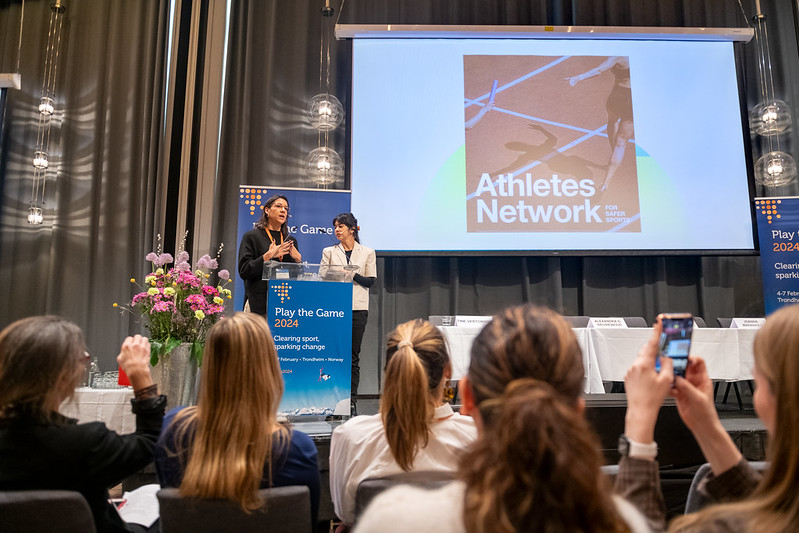
(Photo: Thomas Søndergaard/Play the Game)
Joanna Maranhão and Andrea Florence also took the stage during this panel to discuss the research and methodology behind a new, innovative initiative being piloted by the SRA to develop survivor-led avenues for accountability and healing: the SRA Athletes Network for Safer Sports. They highlighted the Network’s focus on not only following the lead of impacted people, but also compensating them for their time and input. Joanna pointed out how rightfully valuing the expertise of survivors and whistleblowers not only proves that sport honors and respects their experience, but also serves as a form of partial remedy – especially in light of the current reality that so few channels for full, effective and meaningful remedy exist.
Athlete Organizing and Anti-Doping
(Photo: Thomas Søndergaard/Play the Game)
Matthew Graham, interim executive director of SRA partner World Players Association, continued the strong SRA contribution to Play the Game in a session titled “Strengthening athlete power in sport.” Matt connected the struggle for realizing athlete power to World Players’ finds from its research on the right to organize in sport. The report, which is based on a first-of-its-kind survey conducted in 2022 and completed by 78 player associations from 17 sports in 48 countries, identifies key challenges players continue to face in organizing and collective bargaining for their rights as workers and people.
(Photo: Thomas Søndergaard/Play the Game)
On the last day, the conference included a session featuring Ginous (Gigi) Alford, head of human rights and sport at SRA partner World Players Association, and other experts on the question of anti-doping’s compatibility with human rights. Ginous offered the critical player union perspective on how rules to promote clean sport can and must be aligned with international human rights standards. World Players provides concrete recommendations for athlete rights impact assessments that help sports bodies “know and show” how anti-doping systems are connected to potential and actual harms on athletes’ human rights, careers, livelihoods, mental health and reputation – and rebuild athlete trust and confidence in the process.
Human Rights Abuses in Countries Hosting Mega-Sporting Events
In a panel on Saudi Arabia‘s unprecedented investment in the global sporting industry, Human Rights Watch researcher on Saudi Arabia and UAE Joey Shea outlined the human rights abuses connected with the Saudi state’s Public Investment Fund – which has amassed $720 billion in recent years to become one of the world’s largest sovereign wealth funds. Joey emphasized that Saudi citizens have no say in how their wealth – the wealth that belongs to the Saudi public – is spent and controlled and called for global scrutiny and pressure on Saudi Arabia’s compliance with international human rights. “Rights abuses in Saudi Arabia have gotten worse in recent years because of a sustained lack of pressure on the Saudi government,” Joey highlighted. “Sport may be able to bring reform – but we need pressure to make that happen.”
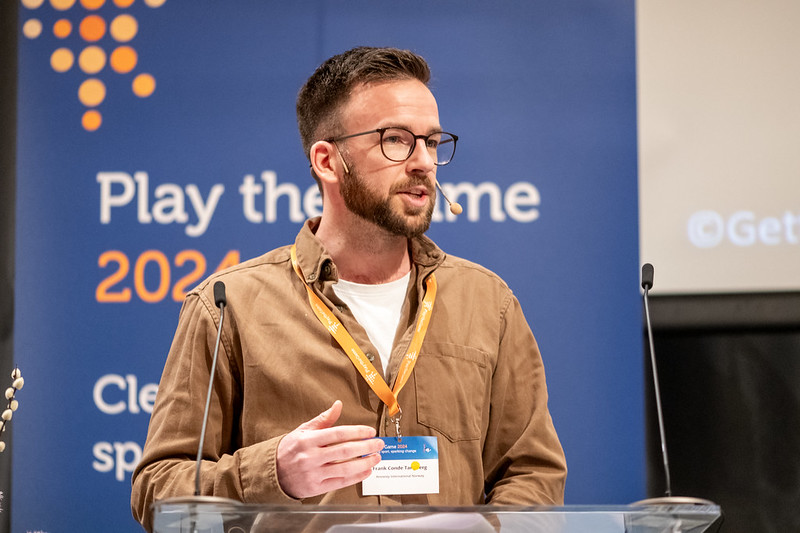
(Photo: Thomas Søndergaard/Play the Game)
Frank Conde Tangberg of Amnesty International Norway also contributed to a panel titled “Who is sportswashing whom?”. Making the case for sport’s power – including that of sport governing bodies, sponsors and other actors – to leverage real human rights change in Saudi Arabia, Frank explored evidence of previous successes using global financial pressure to secure human rights concessions from Saudi Crown Prince Mohammed Bin Salman. Frank called for sport governing bodies to use their influence and negotiating power to secure credible, thorough and transparent human rights risk assessments and mitigation strategies related to a potential 2034 FIFA Men’s World Cup.
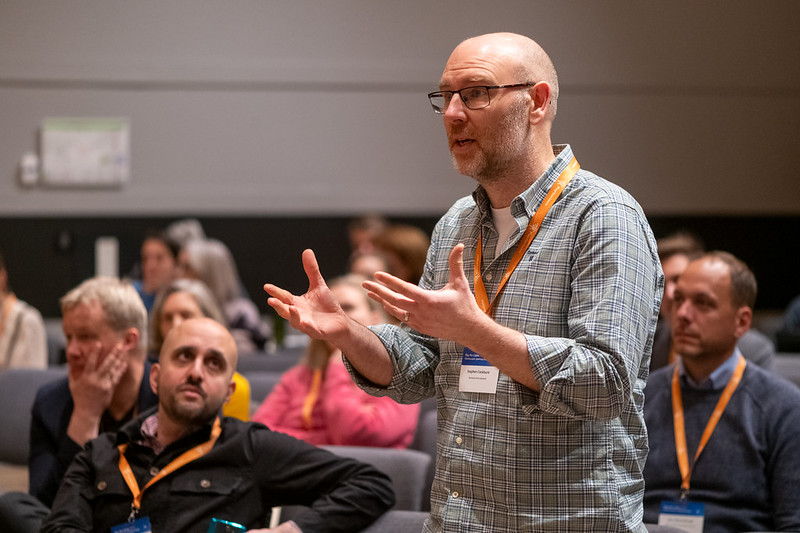
(Photo: Thomas Søndergaard/Play the Game)
In a session titled “Biased, bigoted, boorish? The global debate on Qatar 2022,” Steve Cockburn, head of economic and social justice at SRA partner Amnesty International, posed a critical intervention and question to one of the panel’s speakers who was hired ahead of the 2022 Men’s World Cup to help Qatar to “provide balance” to the critical narrative around the event. Steve acknowledged the importance of reflecting on ethnocentric and racist biases that may influence some of the critique against Qatar, but also warned against confusing attempts to provide nuance to the debate with efforts to obfuscate real abuses. He concluded that it is not racist to advocate for the millions of migrant workers from Nepal, Bangladesh, Philippines and other countries who were exploited, injured or killed on World Cup projects – in fact, “it would be racist not to.”
Athlete Participation: Paris 2024 and Beyond
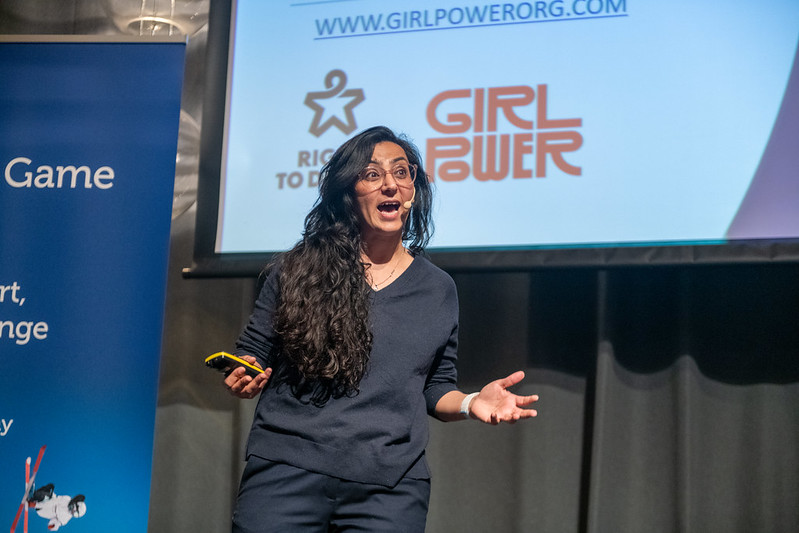
(Photo: Thomas Søndergaard/Play the Game)
In a powerful speech by Khalida Popal, former captain of Afghanistan’s National Women’s Football Team and founder of Girl Power Organization, shared her story of leading the charge for women in sport before the Taliban took power in 2021. As the Taliban immediately banned women and girls from sport and forced countless women’s athletes to evacuate the country, the Afghan football federations and National Olympic Committees are now violating the human rights and gender equity standards set by FIFA and the IOC. “Women were vanished from football in Afghanistan,” Khalida said, “yet football continued.” Now, she continues to advocate for her sisters and fellow teammates who are campaigning for FIFA to be recognized in exile.
(Photo: Thomas Søndergaard/Play the Game)
The final session at Play the Game centered on the question of Russian and Belarusian participation in the Olympic and Paralympic Games, and featured contributions from Anatol Kotau, director of external relations at Belarusian Sport Solidarity Foundation (BSSF), one of the SRA’s strategic partners. Anatol addressed the current issues with the International Olympic Committee’s criteria for “Individual Neutral Athletes” or AINs. Anatol highlighted the irony and injustice of the fact that some of these AINs still have demonstrable connections with Russian or Belarusian military and police structures – while athletes who have been imprisoned or forced to flee these same countries have no chance to compete at Paris 2024. Anatol presented his proposal for a new “Peace Team” that encourages athletes to speak out against the war, provides avenues for displaced athletes to compete, and includes support and protection from retaliation. After a week full of difficult discussions, the BSSF plan offered a welcome glimmer of hope with its bold, yet constructive solution for one of the most fraught debates in sport today.
The Play the Game 2024 conference served as a crucial platform to further the conversation on advancing human rights in and through global sport. We are deeply grateful for the Play the Game organizers and the chance to have such important dialogue with esteemed colleagues, allies and friends. Witnessing the many creative and collaborative efforts from all corners of the globe were truly inspiring – and we leave encouraged and equipped to continue this work throughout the rest of the year and beyond.
